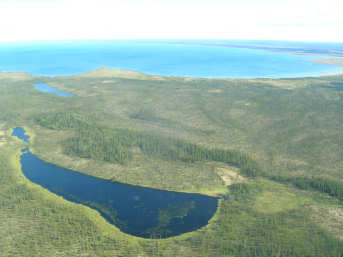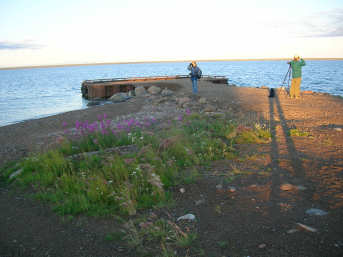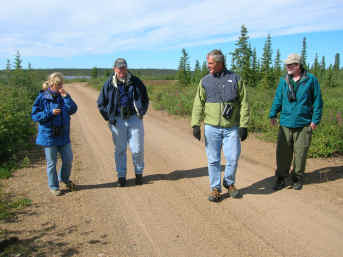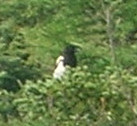 |
Leave it to Pete to count something on our flight from Yellowknife to Deline. For an hour and a half we flew over habitat with not a single sign of humans, an experience that could not be duplicated today anywhere in the U.S. and in few places left on earth. As we were flying I started thinking about how many loons there might be below us if every single one of the lakes and ponds had just a single nesting pair. Pete did a transect count and estimated that we had passed over something like 13,000 lakes and ponds. That's a lot of loons, grebes, scoters, and scaup habitat—no wonder our friends at Ducks Unlimited call it The Other Duck Factory.
We stepped out of the plane at Deline onto the muddy gravel strip and were immediately blasted in the face with a harsh west wind. I was still wearing the light shirt that had been perfect for the 70 degree (F) weather in Yellowknife. It was cold. Crystal from the Grey Goose Lodge met us with the truck to haul us and our luggage down to the lodge. Perhaps the most memorable birding feat of the trip was when Linda, who was perched on Pete who himself was tightly wedged in the backseat of the extended cab pickup between Scott and Mel and surrounded by backpacks and camera gear, spotted a female Northern Harrier and tilted her body just far enough forward that Scott, Mel, and Pete were able to see it as well.
On the way, Crystal gave us the good news, bad news, and just the news.
The bad news: a forest fire had been started by a lightning strike five miles north of town on Monday and evacuation had been discussed.
The good news: fire fighting crews had been able to get the fire under control.
The bad news: the fire fighting crews had to sleep and eat somewhere—somewhere was at the Grey Goose Lodge.
The good news: they were able to find a spot for us to stay in another place in town owned by the lodge and we could get our meals back at the Grey Goose.
Just the news: a large white wolf had been seen around town occasionally which would be cool to see. A grizzly had also been a few times up near the airport and the dump but fortunately not in town.
After a pleasant, warm dinner at the Grey Goose Lodge, the rest of the group decided to use the bad weather as a welcome excuse to hit the sack early. I had made arrangements to install a nocturnal bird migration microphone set-up at Ed's house to explore the mysteries of migration in the Northwest Territories from afar. I had carried all the materials for the microphone all the way from Maine but it still had to be assembled. Ed and I chatted and worked in his workshop and living room. It was together, hooked up to his computer and working by midnight.
 |
Scott and Linda were happily snapping pictures of the full moon hanging over Great Bear Lake as I tumbled out of bed and outside at a little after six the next morning. The Herring Gulls that nest on the rooftops in Deline and that now had almost full grown young wandering around people's yards were just becoming wakeful enough to start their low angry alarm calls and dive bombs of human passersby—in this case me. I stuck my telescope higher over my shoulder to keep them at bay.
Mel joined us in a few minutes down by the dock. Pete had gotten out of the house ahead of the rest of us and was nowhere to be seen. Just as I had experienced here last year, the birding was fabulous—breeding plumaged Pacific Loons and several flocks of Surf Scoters dove just off the dock, Arctic Terns, Bonaparte's Gulls, and Parasitic Jaegers passed offshore. At one point a Parasitic Jaeger came right past us, a twisting and turning sandpiper just inches from his hungry hooked bill. A flock of American Pipits on the gravel beach alongside us and Savannah Sparrows, White-crowned Sparrows and Yellow Warblers were in every yard.
 |
Later, on the way to breakfast I stopped at Ed's to check the listening set-up. It was working perfectly and while checking the sound files I heard a flock of Common Redpolls come through the speakers and then what sounded like a Black-billed Magpie! Later, several people in town told us that they had seen a Black-billed Magpie here this summer. The first time that anyone here had ever seen one. Global warming?
 |
Later in the day I spotted the magpie and got a quick shot of it before it disappeared again.

